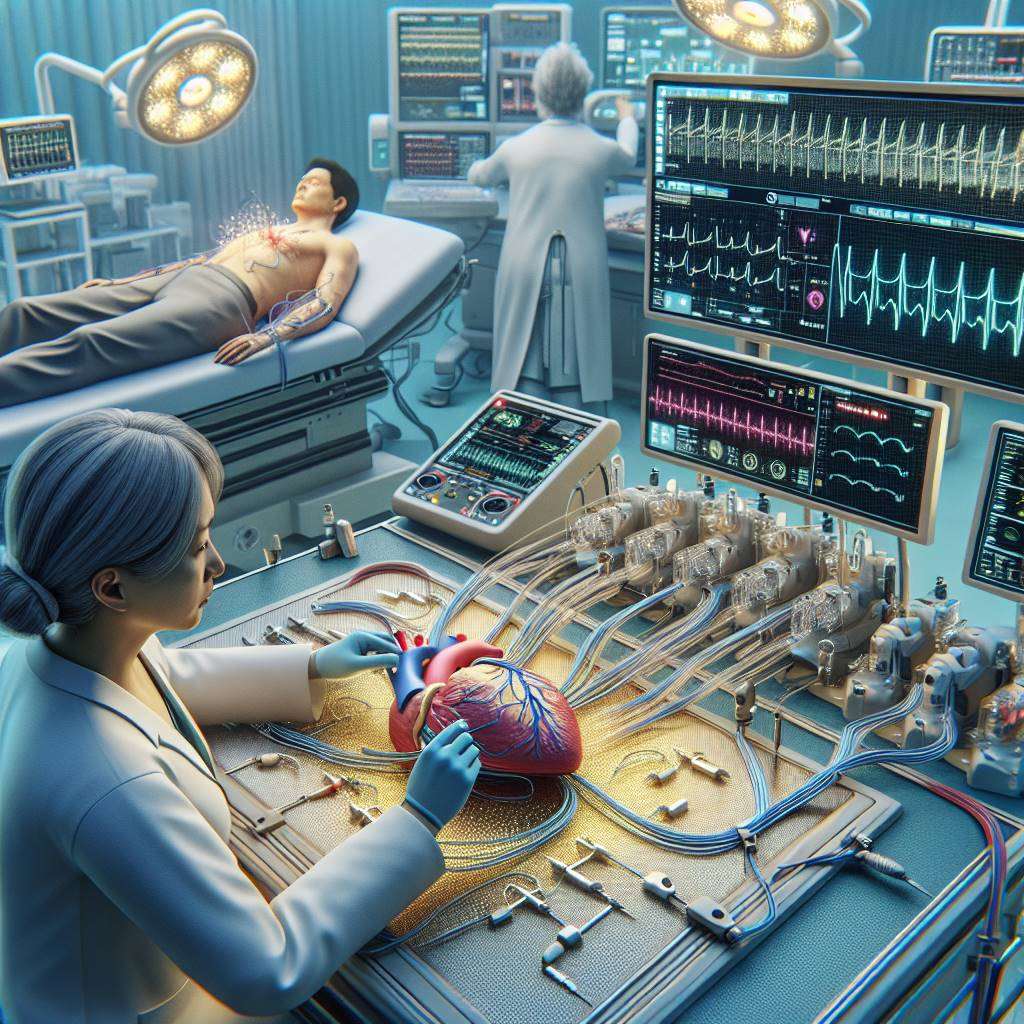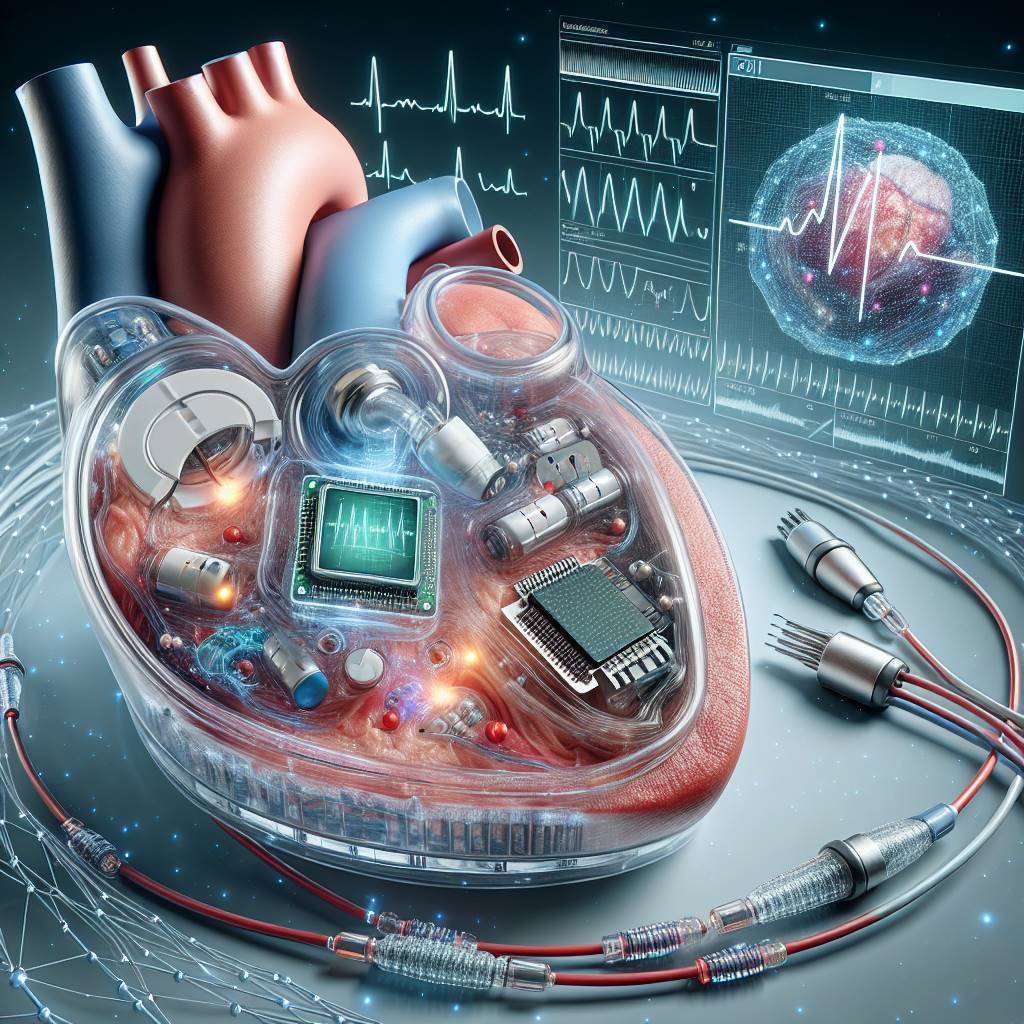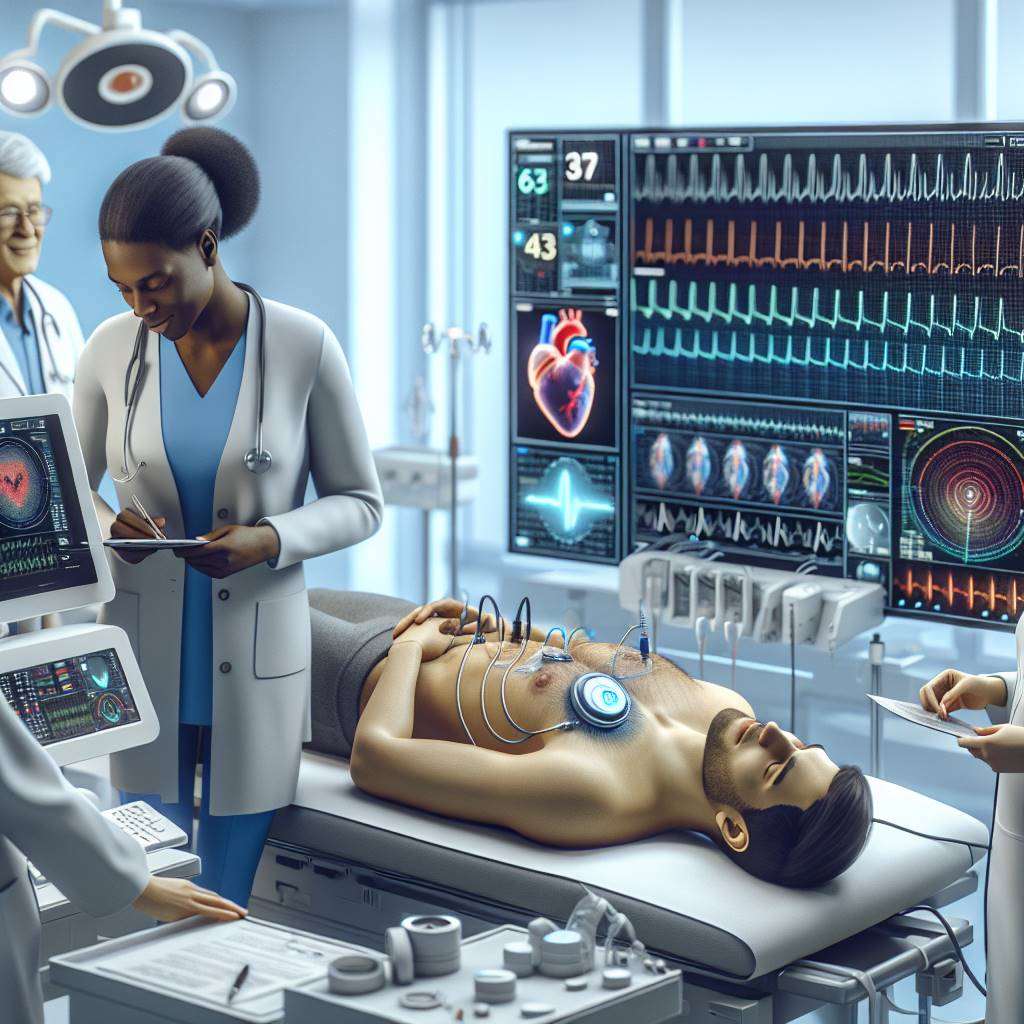Artificial Intelligence (AI) and smart technology are transforming the way pacemakers are programmed, offering more precise and personalized solutions for patients with heart conditions. These advancements help optimize the device's performance, ensuring better heart rhythm management and reducing complications. For patients, this means improved quality of life and fewer hospital visits.
Medical disclaimer: This content is for general awareness and does not replace a doctor’s consultation. For diagnosis or treatment decisions, consult a qualified specialist.
By integrating machine learning and real-time data analysis, pacemakers can now adapt to individual patient needs. This innovation is particularly important in India, where cardiovascular diseases are on the rise. Understanding how these technologies work can empower patients and healthcare providers to make informed decisions about treatment options.
How AI Enhances Precision in Pacemaker Programming
AI is revolutionizing pacemaker programming by enabling highly accurate adjustments tailored to each patient's unique heart condition. Traditional pacemakers rely on fixed settings, which may not always align with the patient's changing needs. However, AI algorithms analyze real-time data, such as heart rate and activity levels, to fine-tune the device's performance.
This precision reduces the risk of complications like arrhythmias or device malfunctions. For example, AI can detect irregular heart rhythms and adjust the pacemaker's settings instantly, ensuring optimal performance. Additionally, AI-powered systems can predict potential issues before they occur, allowing for proactive interventions.
The integration of AI in pacemaker technology not only enhances patient safety but also minimizes the need for frequent manual adjustments by healthcare providers. This is particularly beneficial in rural areas of India, where access to specialized cardiac care may be limited.

Smart Technology Revolutionizing Pacemaker Adjustments
Smart technology is playing a crucial role in modernizing pacemaker adjustments. Devices equipped with Bluetooth and wireless connectivity allow for remote monitoring and programming. This means that patients no longer need to visit the hospital frequently for routine check-ups or adjustments.
Through smartphone apps and cloud-based platforms, doctors can access real-time data from the pacemaker and make necessary changes remotely. This is especially useful for patients in remote or underserved areas. Moreover, smart technology enables continuous monitoring, which helps in detecting anomalies early and preventing emergencies.
The convenience offered by smart pacemakers not only improves patient compliance but also reduces the burden on healthcare systems. By leveraging these advancements, India can address the growing demand for efficient cardiac care.
The Role of Machine Learning in Pacemaker Optimization
Machine learning is a subset of AI that plays a pivotal role in optimizing pacemaker functionality. By analyzing vast amounts of patient data, machine learning algorithms can identify patterns and predict outcomes. This helps in creating personalized programming settings that cater to the specific needs of each patient.
For instance, machine learning can analyze a patient's activity levels, sleep patterns, and heart rate variability to adjust the pacemaker's settings dynamically. This ensures that the device operates efficiently under different conditions, such as during exercise or rest.
Additionally, machine learning can assist in diagnosing complex cardiac conditions by identifying subtle changes in heart rhythms that may go unnoticed by traditional methods. This technology not only enhances the accuracy of pacemaker programming but also contributes to better overall cardiac care.
AI-Powered Pacemakers: A New Era in Cardiology
The advent of AI-powered pacemakers marks a significant milestone in the field of cardiology. These devices are equipped with advanced sensors and AI algorithms that enable them to learn from patient data and adapt accordingly. Unlike traditional pacemakers, AI-powered models offer a more dynamic and responsive approach to heart rhythm management.
One of the key features of these pacemakers is their ability to provide predictive analytics. By analyzing historical and real-time data, they can forecast potential complications and alert both patients and doctors. This proactive approach reduces the risk of emergencies and improves patient outcomes.
Furthermore, AI-powered pacemakers are designed to integrate seamlessly with other medical devices and electronic health records, creating a comprehensive ecosystem for cardiac care. This innovation is particularly promising for India, where the burden of cardiovascular diseases is increasing rapidly.
Benefits of Smart Pacemaker Technology for Heart Patients
Smart pacemaker technology offers numerous benefits for patients with heart conditions. These devices are designed to provide personalized care, ensuring that each patient's unique needs are met. Here are some of the key advantages:
- Improved accuracy: AI and smart technology enable precise adjustments, reducing the risk of complications.
- Remote monitoring: Patients can avoid frequent hospital visits, as doctors can make adjustments remotely.
- Early detection: Continuous monitoring helps in identifying potential issues before they become serious.
- Enhanced quality of life: Patients experience fewer disruptions and better overall health outcomes.
By adopting smart pacemaker technology, India can address the growing prevalence of heart diseases and improve access to quality cardiac care. This innovation not only benefits patients but also reduces the strain on healthcare systems.
How Artificial Intelligence Improves Pacemaker Efficiency
Artificial Intelligence (AI) is revolutionizing the way pacemakers are programmed and managed. By leveraging advanced algorithms, AI can analyze vast amounts of patient data to optimize pacemaker settings. This ensures that the device delivers the most effective therapy for each individual.
One of the key benefits of AI is its ability to detect subtle changes in a patient’s heart rhythm. This allows the pacemaker to adjust in real-time, improving its overall efficiency. Additionally, AI can predict potential issues, such as arrhythmias, before they occur, enabling proactive intervention.
AI also reduces the need for frequent manual adjustments by healthcare professionals, saving time and improving patient outcomes. With these advancements, pacemakers are becoming smarter and more reliable than ever before.

Personalized Pacemaker Settings with AI Algorithms
AI algorithms are transforming the way pacemakers are programmed by enabling personalized settings for each patient. Traditional pacemakers often rely on generalized programming, which may not suit every individual’s unique heart condition. AI, however, uses patient-specific data to create tailored settings.
By analyzing factors such as heart rate variability, activity levels, and medical history, AI ensures that the pacemaker delivers therapy that aligns with the patient’s lifestyle and health needs. This personalized approach minimizes the risk of complications and enhances the device’s effectiveness.
Moreover, AI-powered pacemakers can adapt to changes in the patient’s condition over time, ensuring continuous optimization. This level of customization is a significant step forward in cardiac care.
Smart Pacemakers: Combining AI and Real-Time Monitoring
Smart pacemakers integrate AI technology with real-time monitoring to provide unparalleled insights into a patient’s heart health. These devices continuously track heart rhythms and other vital parameters, sending data to healthcare providers for analysis.
With real-time monitoring, doctors can detect abnormalities early and adjust treatment plans accordingly. For instance, if a patient experiences an irregular heartbeat, the pacemaker can alert the medical team immediately, ensuring timely intervention.
Smart pacemakers also empower patients by providing them with access to their health data through mobile apps. This fosters better communication between patients and doctors, leading to improved outcomes.
- Continuous heart rhythm tracking
- Early detection of abnormalities
- Improved patient-doctor communication
Future Trends in AI-Based Pacemaker Programming
The future of pacemaker programming is being shaped by advancements in AI technology. One emerging trend is the use of machine learning to predict patient outcomes and optimize device settings automatically. This reduces the need for frequent manual adjustments.
Another exciting development is the integration of AI with wearable devices. These wearables can collect additional health data, such as blood pressure and oxygen levels, which can be used to fine-tune pacemaker performance.
Additionally, researchers are exploring the use of AI to develop fully autonomous pacemakers that can make decisions without human intervention. These innovations promise to make cardiac care more efficient and accessible in the coming years.
How Smart Technology Reduces Pacemaker Complications
Smart technology is playing a crucial role in reducing complications associated with pacemakers. By using advanced sensors and AI, modern pacemakers can detect and address issues such as lead dislodgement or battery depletion before they become serious.
For example, AI algorithms can monitor the performance of the pacemaker in real-time, identifying any irregularities that may indicate a problem. This allows for early intervention, reducing the risk of complications.
Smart technology also enhances patient safety by providing remote monitoring capabilities. Doctors can track the device’s performance and make necessary adjustments without requiring the patient to visit the clinic frequently. This not only improves convenience but also ensures timely care.
| Traditional Pacemakers |
Smart Pacemakers |
| Manual adjustments required |
AI-driven automatic adjustments |
| Limited monitoring capabilities |
Real-time remote monitoring |
| Higher risk of complications |
Proactive issue detection |
AI in Cardiac Care: Smarter Pacemaker Adjustments
Artificial Intelligence (AI) is revolutionizing cardiac care by enabling smarter pacemaker adjustments. Traditional pacemakers required manual programming by healthcare professionals, which could sometimes lead to delays in optimizing the device for the patient’s unique needs.
With AI, pacemakers can now analyze a patient’s heart rhythm in real-time and make precise adjustments automatically. This ensures that the device delivers the right level of support at the right time, improving heart health outcomes. AI-driven algorithms also reduce the risk of errors and enhance the overall efficiency of pacemaker programming.
Additionally, AI can predict potential complications by analyzing historical data, allowing for proactive interventions. This innovation is transforming how cardiologists manage cardiac conditions, ensuring better care for patients.

Remote Pacemaker Management with AI and Smart Tools
One of the most significant advancements in pacemaker technology is the integration of AI with remote monitoring tools. Patients no longer need frequent hospital visits for device adjustments, as smart tools enable remote pacemaker management.
AI-powered systems can monitor a patient’s heart activity continuously and send real-time data to healthcare providers. This allows doctors to assess the pacemaker’s performance and make necessary changes remotely. Such systems are particularly beneficial for patients in rural areas or those with limited mobility.
Remote management also enhances patient convenience and reduces healthcare costs. By using smart tools, patients can enjoy peace of mind knowing their cardiac health is being monitored 24/7. This innovation is a game-changer in modern cardiology.
How AI Detects and Adapts to Heart Rhythm Changes
AI has the unique ability to detect subtle changes in a patient’s heart rhythm that might go unnoticed during routine check-ups. Advanced algorithms analyze data from the pacemaker and identify irregularities such as arrhythmias or abnormal heartbeats.
Once these changes are detected, AI can adapt the pacemaker’s settings in real-time to address the issue. For example, if a patient experiences a sudden drop in heart rate, the pacemaker can immediately adjust to provide the necessary support. This ensures that the patient’s heart functions optimally at all times.
By continuously learning from the patient’s heart activity, AI-driven pacemakers offer a personalized approach to cardiac care. This not only improves patient outcomes but also reduces the risk of complications.
Smart Pacemaker Programming: What Patients Should Know
For patients, understanding the benefits of smart pacemaker programming is crucial. Unlike traditional devices, AI-powered pacemakers are designed to adapt to the patient’s unique cardiac needs without frequent manual adjustments.
Patients should know that these devices use advanced algorithms to monitor and respond to changes in their heart rhythm. This means fewer hospital visits and a more seamless experience. Additionally, smart pacemakers can alert healthcare providers to potential issues, ensuring timely interventions.
- Improved accuracy in heart rhythm management
- Reduced need for manual adjustments
- Enhanced patient convenience and safety
By embracing this technology, patients can enjoy better quality of life and greater confidence in their cardiac health.
AI and IoT: Transforming Pacemaker Functionality
The combination of AI and the Internet of Things (IoT) is transforming pacemaker functionality. IoT-enabled pacemakers can connect to other smart devices, creating a network that enhances data sharing and analysis.
For instance, IoT allows pacemakers to send real-time data to healthcare providers, enabling continuous monitoring. This connectivity also facilitates integration with wearable devices, providing patients with insights into their heart health. Such innovations empower patients to take an active role in managing their condition.
Moreover, AI enhances this ecosystem by analyzing the collected data and making intelligent adjustments to the pacemaker. Together, AI and IoT are paving the way for a new era in cardiac care, ensuring better outcomes and improved patient satisfaction.
Best Pacemaker Surgery Doctors in India
Dr. Balbir Singh, a renowned cardiologist at Medanta - The Medicity, Gurugram, specializes in electrophysiology with over 30 years of experience. Another expert is Dr. Nityanand Tripathi from Fortis Escorts Heart Institute, Delhi, with DM in Cardiology and extensive international exposure in advanced pacemaker programming. Both doctors are recognized for their medical excellence and patient-centric care.
Learn more on best pacemaker implantation surgery doctors in india
Best Pacemaker Surgery Hospitals in India
Fortis Escorts Heart Institute, Delhi, and Apollo Hospitals, Chennai, are leading centers for advanced pacemaker programming. Both are NABH and JCI accredited, offering cutting-edge technologies like robotic cardiac procedures and comprehensive care. These hospitals are known for their international patient services and high success rates in complex cardiac cases.
Find more best pacemaker implantation surgery hospitals in india
Pacemaker Surgery Cost in India
The cost of pacemaker programming in India typically ranges between INR 1,50,000 to 5,00,000 (approximately USD 1,800 to 6,000). Factors such as the doctor’s expertise, hospital type, and complexity of the procedure influence the cost. Patients benefit from shorter hospital stays and a significant cost advantage compared to Western countries. Medical insurance and third-party financing options are widely available.
Learn pacemaker implantation surgery cost in india
Pacemaker Surgery Treatment in India
Pacemaker programming in India involves non-invasive adjustments using advanced software to optimize device settings. Top hospitals employ AI-driven technologies and remote monitoring for precision. Recovery is immediate as the procedure is painless and does not require hospitalization. Indian hospitals adhere to global medical protocols, ensuring safety and efficacy for international patients.
Learn on Pacemaker Surgery Treatment in India
FAQs
What is pacemaker programming?
Pacemaker programming involves adjusting the settings of a cardiac pacemaker to ensure it functions optimally for a patient’s specific heart condition. This is done using specialized software and devices.
How does AI improve pacemaker programming?
AI enhances pacemaker programming by analyzing large datasets to predict patient needs, enabling personalized and precise adjustments. It also facilitates remote monitoring and early detection of issues.
Is pacemaker programming a painful procedure?
No, pacemaker programming is a non-invasive and painless procedure. It is performed externally using a programmer device without any surgical intervention.
How often should pacemaker programming be done?
The frequency of pacemaker programming depends on the patient’s condition and the type of device. Typically, it is done during routine follow-ups or when adjustments are needed.
Can pacemaker programming be done remotely?
Yes, many modern pacemakers support remote programming and monitoring, allowing doctors to make adjustments without requiring the patient to visit the hospital.
Are Indian hospitals equipped for advanced pacemaker programming?
Yes, leading Indian hospitals are equipped with state-of-the-art technology and experienced specialists to perform advanced pacemaker programming, adhering to international standards.
What are the risks associated with pacemaker programming?
Pacemaker programming is generally safe. However, incorrect settings may lead to arrhythmias or suboptimal device performance, which is why it must be performed by trained professionals.
How long does a pacemaker programming session take?
A typical pacemaker programming session lasts 30 to 60 minutes, depending on the complexity of the adjustments required.
What qualifications should a doctor have for pacemaker programming?
Doctors specializing in cardiology, particularly those trained in electrophysiology, are qualified to perform pacemaker programming. They often hold advanced degrees like DM in Cardiology.
Is pacemaker programming covered by insurance in India?
Yes, most health insurance plans in India cover pacemaker programming as part of cardiac care. Patients should confirm coverage details with their insurer.
Understanding Modern Pacemakers: Innovations and Lifestyle Adjustments
As technology advances, the field of cardiac care continues to evolve, particularly with the introduction of leadless pacemakers. These innovative devices represent a significant leap forward, offering patients a less invasive option for heart rhythm management. To learn more about this groundbreaking technology, check out our blog on Leadless Pacemakers: A New Era in Cardiac Care.
While leadless pacemakers provide numerous benefits, it's essential for patients to understand how to adapt their lifestyles post-implantation. Engaging in certain activities may be restricted, and knowing what you can and cannot do is crucial for maintaining your health. For detailed guidance on managing your daily life with a pacemaker, read our article on Living With a Pacemaker: Activities You Can and Can't Do.
By staying informed about both the technological advancements and lifestyle considerations, patients can navigate their cardiac care journey with confidence and ease.